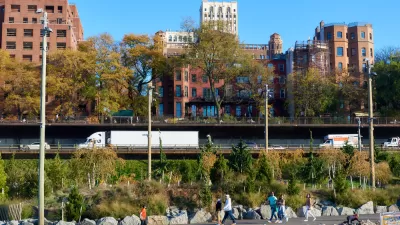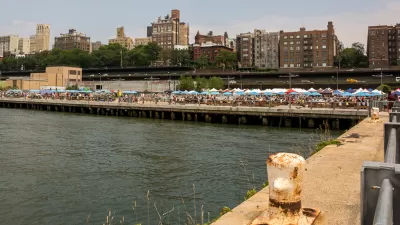Lisa W. Foderaro reports on a new deal that enables adaptive reuse of historic structures and commercial development at Brooklyn Bridge Park, and ends a long-simmering dispute.
Brooklyn Bridge Park is clearing the way for commercial development in the area formerly known as Empire Fulton Ferry Park. The Tobacco Warehouse, currently a brick shell from the Civil War Era, and Empire Stores will be redeveloped into a cultural facility and commercial retail complex. Brooklyn Bridge Park was developed beginning in 2007 as part of a chain of parks along the East River, which will incorporate the Brooklyn Greenway. When the project is completed the East River will be flanked by a series of parks and a continuous bike path similar in concept to Boston's Emerald Necklace. The park currently incorporates Pier 1, Pier 6, and Empire Fulton Ferry into a series of playgrounds, seating, natural landscapes, and, most recently, a restored carousel encased in a glass box designed by Jean Nouvel.
The existing Tobacco warehouse shell sits on a natural beach with a small strip of sand and and rocks bordered by tall native grasses. The site provides a pleasant alternative to the heavily landscaped hills south of the Brooklyn Bridge. The warehouse was initially promised to St. Ann's Warehouse, a local avant-garde theatre which has been in the neighborhood since 2000. Last July, a Federal District Court ruled against St. Ann's occupation of the site warning it would set a dangerous precedent for both historic properties and park land to be threatened by commercial interests.
Senator Daniel L. Squadron and Assemblywoman Joan L. Millman helped broker the development agreement in response to the court's injunction. In exchange for Empire Stores and Tobacco Warehouse, the state will donate one acre of parkland, which will be planned through a community design process.
Despite the agreement of neighborhood associations, critics claim much of the land already feels privatized. For critics, the trend of privatizing public space through commercial enterprise is a mounting concern as many cities are seeking ways to fund park maintenance in light of depleted budgets.
Thanks to Elaine Mahoney
FULL STORY: Deal Allows Development in Brooklyn Bridge Park

Planetizen Federal Action Tracker
A weekly monitor of how Trump’s orders and actions are impacting planners and planning in America.

San Francisco's School District Spent $105M To Build Affordable Housing for Teachers — And That's Just the Beginning
SFUSD joins a growing list of school districts using their land holdings to address housing affordability challenges faced by their own employees.

The Tiny, Adorable $7,000 Car Turning Japan Onto EVs
The single seat Mibot charges from a regular plug as quickly as an iPad, and is about half the price of an average EV.

With Protected Lanes, 460% More People Commute by Bike
For those needing more ammo, more data proving what we already knew is here.

In More Metros Than You’d Think, Suburbs are Now More Expensive Than the City
If you're moving to the burbs to save on square footage, data shows you should think again.

The States Losing Rural Delivery Rooms at an Alarming Pace
In some states, as few as 9% of rural hospitals still deliver babies. As a result, rising pre-term births, no adequate pre-term care and "harrowing" close calls are a growing reality.
Urban Design for Planners 1: Software Tools
This six-course series explores essential urban design concepts using open source software and equips planners with the tools they need to participate fully in the urban design process.
Planning for Universal Design
Learn the tools for implementing Universal Design in planning regulations.
Smith Gee Studio
City of Charlotte
City of Camden Redevelopment Agency
City of Astoria
Transportation Research & Education Center (TREC) at Portland State University
US High Speed Rail Association
City of Camden Redevelopment Agency
Municipality of Princeton (NJ)





























